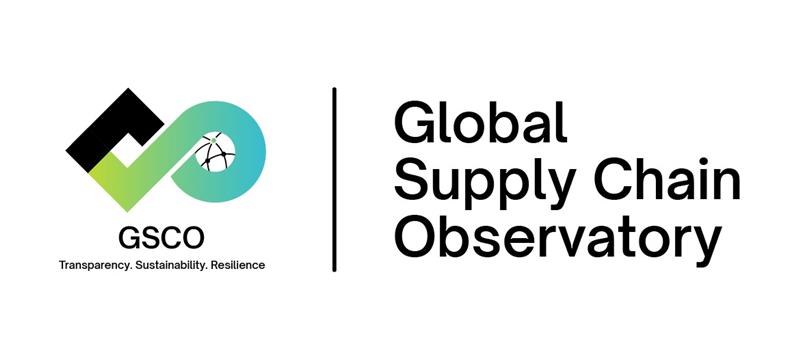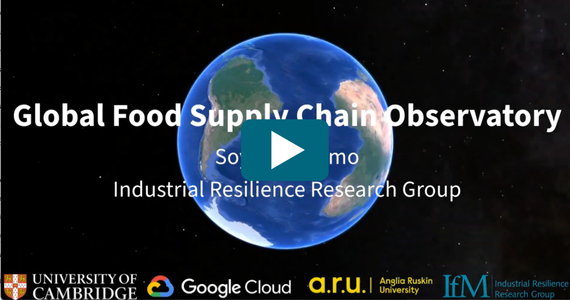Global Supply Chain Observatory

Overview
The Global Supply Chain Observatory (GSCO) represents a pioneering research initiative within Cambridge University's Institute for Manufacturing, Industrial Resilience Research Group by advancing supply chain visibility, traceability and transparency, by drawing on open data, data science, artificial intelligence, and satellite-based remote sensing. The primary objective centres on near real-time identification and assessment of supply chain blind spots, enabling proactive intervention strategies that preserve operational continuity, regulatory compliance, and policy interventions, across global value networks.
Theoretical Framework
The observatory operationalises key theoretical constructs from socio-technical systems theory and global value chain analysis, emphasising supply chain visibility, disruption anticipation, and adaptive capacity. Here, the Global Supply Chain Observatory extends traditional efficiency paradigms by incorporating network redundancy, risk diversification, and adaptive flexibility mechanisms. This represents a forward approach for more resilient supply network architectures grounded in control theory, supply network dynamics, and systems thinking.
Research Methodology
Data Integration and Network Mapping
The observatory employs multi-source data inputs, synthesising and ingesting international trade databases, satellite imagery, environmental monitoring systems, geopolitical intelligence feeds, and open-source data. This comprehensive architecture enables detailed global supply chain mappings, particularly for critical mineral supply networks and global food systems.
Advanced Analytics
Using over 4000 data points, methodologies including machine learning algorithms and large language models, facilitate sophisticated scenario-based stress testing under simulated conditions. The analytical framework focuses on visibility, transparency and traceability indicators, and establishes risk parameters across multiple supply chain configurations.
Environmental and Compliance Assessment
Through integration of satellite environmental data with regulatory frameworks, the observatory conducts comprehensive assessments of carbon emissions, deforestation impacts, and Environmental, Social, and Governance compliance risks. This capability aligns with Scope 3 carbon accounting requirements and emerging regulations such as the EU Carbon Border Adjustment Mechanism.
Visibility, Traceability, and Transparency
Supply Chain Visibility
The observatory develops comprehensive visibility mechanisms that map complex multi-tier supplier networks, identifying critical nodes, bottlenecks, and dependency relationships. Advanced visualisation tools and bespoke templating not only reveal hidden supply pathways and quantify visibility gaps across different industry sectors, but enables responses to academic, industrial and policy questions.
End-to-End Traceability
Combined with open data, traceability systems, such as Googles Earth Engine enable visualisation of materials and products from source to consumer, by combining unique datasets to infer supply chain risk profiles. This capability enables rapid identification verification of sustainability claims, and assessment of ethical sourcing practices throughout complex global networks.
Transparency Enhancement
Using open data, and state of the art ingestion pipelines, the observatory facilitates greater transparency in supplier practices, environmental impacts, and labour conditions. Transparency dashboards enable stakeholders to access information about supply chain performance and compliance status.
Research Challenges
The Blind Spot Paradox
With limitless data, failure to identify trade disruptions and supplier risk still remain high causes of supply network breakdowns. These blind spots, still occur while achieving substantial mapping coverage as inferring informal supplier relationships remains methodologically constrained. This reflects the observer effect in socio-technical networks, where visibility mechanisms bias toward documented flows, potentially overlooking vulnerabilities from informal network nodes.
Predictive Model Limitations
Machine learning systems face overfitting risks to historical patterns. The challenge involves balancing statistical learning with domain knowledge, ensuring model generalisability across tail-risk events beyond historical distributions. Moreover, sentiment analysis shows that interpretation of model outputs themselves by Large Language Models remains a consistency risk.
Multi-Scale Integration
Integrating cross-scale dynamics spanning firm operational choices, national regulatory transitions, and global climate disruptions presents significant challenges in multilevel systems modelling.
Core Capabilities
The observatory delivers comprehensive supply chain intelligence through detailed network mapping, advanced stress-testing methodologies, environmental footprint assessment, regulatory compliance tracking, and systematic evaluation of sourcing practices across global supply networks.
Research Focus
Research priorities encompass critical minerals, rare eath elements, electric vehicle battery manufacturing, photovoltaic technology systems, and global food supply chains.
Leadership and Partnerships
The observatory operates under Dr Mukesh Kumar's academic direction, supported by specialised research leadership in supply chain analytics, resilience modelling, and cloud manufacturing systems. Strategic partnerships include Google Cloud collaboration for advanced computational infrastructure.
Focus Industries
- Critical Minerals
- Rare Earth Elements
- Permanent Magnet manufacturing
- EV Battery Manufacturing
- PV Manufacturing
- Food Systems
- Semiconductor Manufacturing (under consideration)
- Electronics Manufacturing
- Textile, clothing and footwear (TCF) industry
Team
- Dr Mukesh Kumar: GSCO Director
- Garry Clawson: GSCO Lead
- Wei Nie: GSCO Lead Researcher in Supply Chain Visibility and Big Data
- Edison Li: GSCO Lead Researcher in Supply Chain AI and Imaging
- Mariel Alem Fonseca: GSCO Lead Researcher in Supply Chain Resilience
- Dr Deepesh Jayasekara: Lead Enterprise Collaboration, Industrial Fellow, GSCO Lead Researcher in Cloud Manufacturing and Supply Chain
- Rana Hajirasouli: Industrial Fellow
Read more
https://www.infosys.com/iki/videos/industrial-resilience-impact.html











